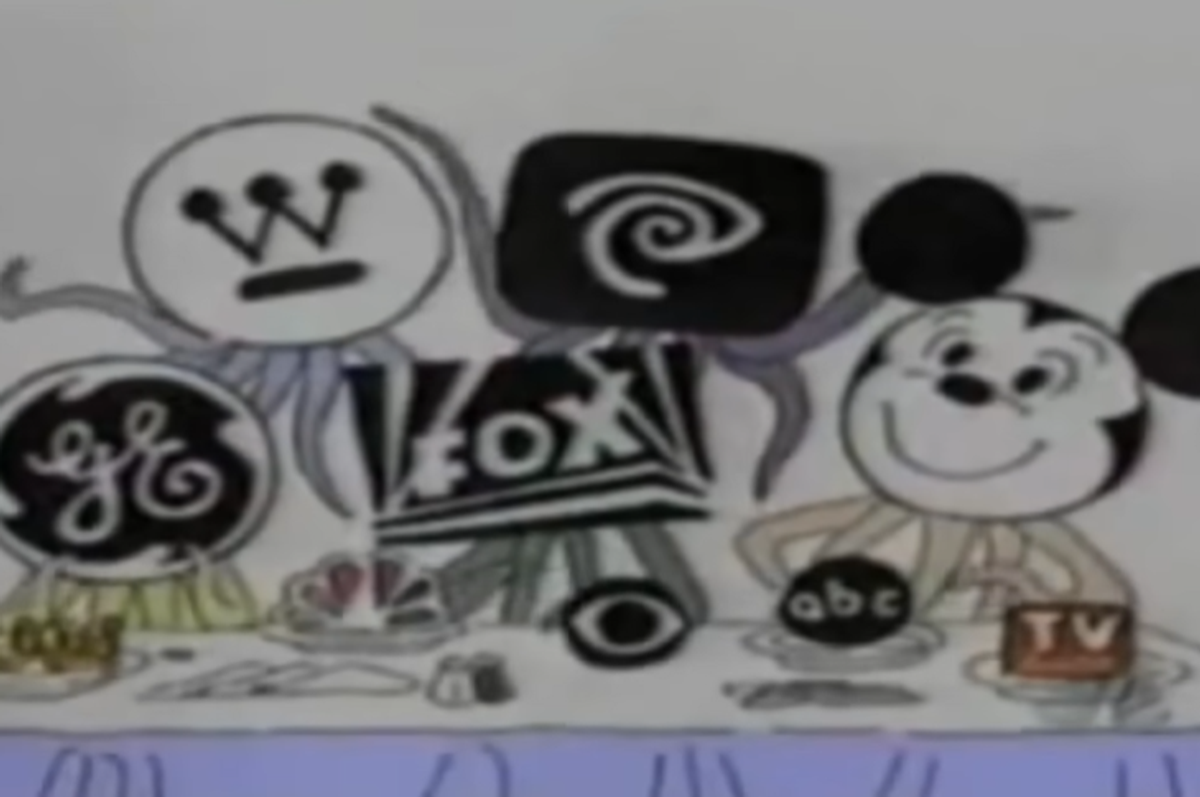SNL ‘kinda’ banned this 1998 'Schoolhouse Rock' parody warning about corporate media control
Let's watch "Conspiracy Theory Rock."

Conspiracy Theory Rock, from "Saturday Night Live."
In 1996, President Bill Clinton signed the Telecommunications Act, which reduced Federal Communications Commission (FCC) regulations on cross-ownership so that major corporations could buy up smaller media outlets nationwide. This deregulation had far-reaching results, and 20 years later, 90% of the country’s major media companies were owned by just six corporations.
The consolidation of power over the country’s media into the hands of a few corporations rightfully disturbed many Americans who were worried a few powerful interests could shape the national narrative. “Saturday Night Live” writer Robert Smigel, who created the show’s “TV Funhouse” segment, best known for animated sketches featuring the “Ambiguously Gay Duo” and “The New Adventures of Mr. T,” took dead aim at the corporate media in a 1998 episode with a 2-minute “Schoolhouse Rock” parody called “Conspiracy Theory Rock.”
“Conspiracy Theory Rock” was a brave SNL piece because it didn’t hold back when discussing General Electric, NBC’s parent company. The sketch accuses GE of media manipulation, corporate welfare, influencing the FCC, manufacturing nuclear weapons, and producing cancer-causing pollution.
The controversial cartoon was reviewed by NBC corporate before hitting the air. “It did go through an extensive note process, beyond the Standards dept, and up the executive ladder,” Smigel recalled in an Instagram post. “I remember adding the ‘voices in my head’ line per their request to make the narrator seem crazier, not that it made a big difference.” But after a few minor notes, the network aired the sketch on the March 14 episode featuring host Julianne Moore and Backstreet Boys.
- YouTubewww.youtube.com
Did ‘Saturday Night Live’ ban ‘Conspiracy Theory Rock’?
Over the past 26 years, “Conspiracy Theory Rock” has earned the reputation of being a “banned” sketch, but that may be a bit of a conspiracy in and of itself. Was it cut from subsequent airings because it was controversial or because it simply wasn’t funny? SNL executive producer Lorne Michaels claims the cartoon was cut from reruns because it merely “wasn’t funny,” so they ran the second Backstreet Boys performance instead. It’s worth noting that when SNL episodes are rerun, they are often only an hour long (including commercials) instead of the usual 90-minute runtime.
However, Smigel's recollection breathes a bit of life into the controversy.
“Months passed, and all was calm until Adam McKay approached me,” Smigel recalled. “A pissed-off crew member had let Adam know the sketch was being cut from the rerun, replaced by a second Backstreet Boys song, which had no mentions of GE polluting the environment. I wasn't especially surprised, but Adam was fired up. He leaked the story to a few TV journalists who'd written about the cartoons. NBC claimed it wasn’t funny (not that it was), and that's why people know and still talk about it today.”
The sketch would be included in the 2006 “Best of TV Funhouse” DVD, so Smigel believes it has only been “kinda banned.” However, the cartoon does not appear in the rerun of the March 14, 1998 episode currently streaming on Peacock. The Backstreet Boys performance is also not included due to music rights issues.
Ultimately, it’s hard to know whether the cartoon was banned or dropped from broadcasts due to its lack of humor. But we know that Smigel was brave in pointing out the problems posed by corporate media control. His willingness to criticize those in power reminds us how rare it is to see satire that questions the very system airing it. Twenty-six years later, it still makes the rounds online because the problems he pointed out are still with us today.





 Buddy Holly was 20 years old in this photo.
Buddy Holly was 20 years old in this photo.  30 going on 60…
30 going on 60… Other folks understood his dilemma.
Other folks understood his dilemma.  The first deposit of orange peels in 1996.
The first deposit of orange peels in 1996. The site of the orange peel deposit (L) and adjacent pastureland (R).
The site of the orange peel deposit (L) and adjacent pastureland (R). Lab technician Erik Schilling explores the newly overgrown orange peel plot.
Lab technician Erik Schilling explores the newly overgrown orange peel plot. The site after a deposit of orange peels in 1998.
The site after a deposit of orange peels in 1998. The sign after clearing away the vines.
The sign after clearing away the vines. Happy Duck Dynasty GIF by DefyTV
Happy Duck Dynasty GIF by DefyTV tv land permission GIF by YoungerTV
tv land permission GIF by YoungerTV Hbo Therapy GIF by SuccessionHBO
Hbo Therapy GIF by SuccessionHBO Hungry Thanksgiving GIF by Looney Tunes
Hungry Thanksgiving GIF by Looney Tunes Feelings Feels GIF by WE tv
Feelings Feels GIF by WE tv Sobriety GIF by Lady Gaga
Sobriety GIF by Lady Gaga